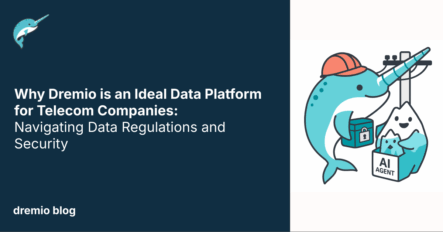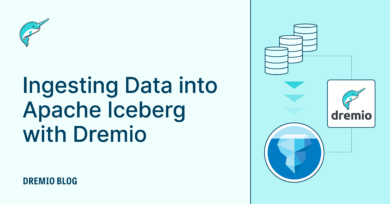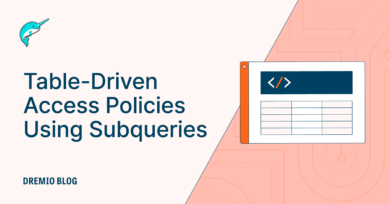12 minute read · September 18, 2025
Why Dremio is an Ideal Data Platform for Telecom Companies: Navigating Data Regulations and Security
· Head of DevRel, Dremio

Telecommunications companies sit at the center of the world’s digital connectivity, powering everything from mobile networks to internet services. But with this responsibility comes a unique challenge: telecom providers handle some of the most sensitive forms of customer information, including call records, location data, and usage patterns. A single breach of this trust doesn’t just risk customer relationships, it can invite massive regulatory fines and long-term reputational damage.
The regulatory environment for telecom data is especially complex. In the U.S., the Federal Communications Commission (FCC) enforces strict Customer Proprietary Network Information (CPNI) rules, requiring carriers to safeguard customer records and notify both regulators and customers in the event of a breach. Meanwhile, global frameworks like the General Data Protection Regulation (GDPR) in Europe and state-level laws such as the California Consumer Privacy Act (CCPA/CPRA) impose stringent requirements, including hefty penalties for misuse or inadequate protection of personal data.
Against this backdrop, telecom providers need more than just storage and analytics, they need a secure, compliant, and modern data platform. This blog explores the regulatory challenges telecom companies face and why Dremio’s Lakehouse Platform offers an ideal foundation for meeting compliance obligations while unlocking the value of telecom data.
The Regulatory Landscape for Telecom Data
Telecom companies operate under some of the strictest data protection regimes in the world. Unlike many industries, where regulations primarily cover financial or health records, telecom regulations extend to everyday digital interactions , from phone calls to text messages and internet traffic metadata. This breadth of oversight creates a uniquely demanding compliance environment.
- FCC’s CPNI Rules (United States). In the U.S., the Federal Communications Commission requires carriers to protect Customer Proprietary Network Information (CPNI), which includes details about who customers communicate with, the duration of calls, and their location at the time. Providers must obtain explicit customer consent before using or sharing this data, and they are obligated to report any breaches to both regulators and consumers. Failure to comply has already led to multimillion-dollar fines against major carriers.
- GDPR (Europe). For providers serving European customers, the General Data Protection Regulation enforces strict requirements on how personal data is collected, stored, and shared. Non-compliance can trigger penalties of up to €20 million or 4% of global annual revenue, whichever is higher, making GDPR enforcement a major risk factor for global telecoms.
- CCPA/CPRA (California). In the U.S., state-level laws like the California Consumer Privacy Act (and its amendment, the CPRA) grant consumers rights to know, delete, or restrict the sale of their data. Penalties can reach $7,500 per intentional violation, which quickly scales into millions for companies handling large customer bases.
- Data Sovereignty Rules. Many countries enforce that citizen data must remain within national borders. Telecom providers operating globally must design platforms that respect these sovereignty requirements, ensuring data residency while still enabling cross-border analytics.
Together, these overlapping regulations mean telecom companies must design platforms with compliance by default. Beyond just encryption or access controls, telecom data platforms need governance, transparency, and adaptability to regional laws.
Challenges in Managing Telecom Data Under Regulation
While telecom providers understand the importance of compliance, the reality of managing regulated data is far from simple. Legacy systems, fragmented architectures, and siloed data make it difficult to enforce consistent policies across the enterprise. Some of the key challenges include:
- Siloed and Disparate Systems. Telecom companies often operate on a patchwork of legacy databases, proprietary systems, and third-party applications. This fragmentation makes it hard to apply uniform security and governance policies, increasing the risk of regulatory violations.
- Complex Consent Management. Regulations like CPNI, GDPR, and CCPA require explicit customer consent before data is used or shared. Tracking, storing, and enforcing these consents across distributed systems is an ongoing operational burden.
- Data Sovereignty Pressures. With laws requiring that certain categories of data remain within national borders, telecoms face logistical challenges ensuring data residency without sacrificing analytical performance or global coordination.
- High Penalties for Non-Compliance. Whether it’s multimillion-dollar fines from the FCC for mishandling CPNI or GDPR penalties tied to global revenue, the financial stakes are too high to risk manual or ad-hoc compliance processes.
- Balancing Compliance with Innovation. Telecom companies need to leverage data for analytics, AI, and customer experience improvements. Yet, overly rigid compliance systems can slow innovation and prevent companies from extracting value from their data.
These challenges highlight the need for a modern data platform that not only centralizes access to telecom data but also embeds compliance and governance into its core architecture.
Try Dremio’s Interactive Demo
Explore this interactive demo and see how Dremio's Intelligent Lakehouse enables Agentic AI
What Telecom Companies Need in a Secure Data Platform
To successfully navigate today’s regulatory landscape while still driving business innovation, telecom providers need more than just secure storage. They need a platform designed to balance compliance, performance, and accessibility. The ideal solution should provide:
- End-to-End Data Governance. A unified way to track, audit, and control access to data across all systems, ensuring compliance with CPNI, GDPR, and CCPA without duplicating effort.
- Granular Access Controls. Role-based and attribute-based access control (RBAC/ABAC) so that sensitive customer data is only accessible to authorized users, with dynamic enforcement of policies.
- Encryption and Masking. Strong encryption both in transit and at rest, coupled with dynamic data masking to protect personally identifiable information (PII) while still enabling analytics.
- Data Sovereignty Support. Flexibility to store data in-region or in-country to comply with data residency requirements, while still enabling federated queries across borders where permitted.
- Operational Efficiency. Automation for compliance reporting, breach notifications, and audit trails, reducing the manual burden on IT and compliance teams.
- Self-Service Analytics with Guardrails. Business and technical users should be able to query and analyze data securely, with built-in governance to ensure compliance is never compromised.
By aligning with these requirements, telecom providers can transform compliance from a reactive burden into a proactive advantage, laying the groundwork for innovation in areas like AI, customer personalization, and network optimization.
Why Dremio is the Ideal Platform for Telecom Data
Meeting the stringent requirements of telecom regulations while still enabling fast, accessible analytics demands a modern data architecture. Dremio’s Lakehouse Platform delivers exactly that , combining compliance-ready features with the flexibility and performance telecom providers need.
- Unified Data Access and Governance. Dremio connects directly to diverse data sources without requiring data movement, giving telecoms a single point of access with consistent governance. Built-in policy enforcement ensures compliance across silos.
- Robust Security Features. With enterprise-grade encryption, fine-grained role-based access control (RBAC), and dynamic data masking, Dremio protects sensitive telecom data such as CPNI while still supporting broad analytics use.
- Compliance Frameworks. Dremio is designed with regulatory readiness in mind, supporting compliance with SOC 2 Type II, ISO 27001, GDPR, CCPA/CPRA, and HIPAA. This ensures telecoms can operate confidently in global and multi-jurisdictional environments.
- Data Sovereignty Flexibility. By enabling queries where data lives, Dremio supports compliance with data residency rules, reducing the need to replicate or transfer sensitive customer data across borders.
- Performance for Innovation. Dremio’s unique acceleration technologies, such as Reflections, allow telecom companies to query massive datasets in seconds. This means compliance does not come at the cost of speed, empowering teams to innovate while staying within regulatory boundaries.
- Self-Service with Guardrails. Business analysts and data scientists can access and analyze data through Dremio’s semantic layer without compromising compliance, giving telecoms the agility to innovate while retaining oversight.
In short, Dremio transforms compliance from a bottleneck into a foundation , enabling telecom companies to meet strict obligations while continuing to unlock the value of their data.
Real-World Applications for Telecom Companies
A secure and compliant platform is only part of the equation , telecom companies also need to generate tangible business value from their data. With Dremio, compliance and performance go hand-in-hand, enabling use cases that directly improve operations and customer experience.
- Fraud Detection and Prevention. Telecom fraud costs billions annually, from SIM swaps to unauthorized account access. Dremio enables real-time analysis of call records, location data, and usage patterns, helping providers detect anomalies faster while ensuring sensitive information remains protected.
- Customer Experience Optimization. By unifying subscriber data across multiple systems, Dremio allows telecoms to personalize offers, improve churn prediction, and optimize service quality , all while respecting consumer privacy rights under regulations like CCPA and GDPR.
- Network Performance Monitoring. Telecoms can leverage Dremio’s high-performance querying to analyze network traffic and usage data at scale, identifying bottlenecks and improving service delivery without moving data into multiple warehouses.
- Regulatory Reporting. With built-in governance, lineage, and audit trails, Dremio streamlines regulatory reporting processes. Carriers can generate reports for FCC or GDPR compliance directly from the platform, reducing manual overhead and audit risks.
These use cases show that compliance doesn’t have to slow telecom innovation. With Dremio, providers can meet regulatory obligations while gaining the agility to compete in a fast-changing digital landscape.
Built-In Compliance and Security Assurances
Telecom companies cannot afford to rely on platforms that “might” meet regulatory standards , they need proven, auditable compliance. Dremio is designed with security and certification at its core, giving providers confidence that their data practices align with industry and legal obligations.
- Industry Certifications. Dremio maintains compliance with SOC 2 Type II and ISO 27001, demonstrating adherence to globally recognized standards for information security and operational controls.
- Privacy Law Readiness. The platform supports compliance with GDPR and CCPA/CPRA, ensuring that consumer rights around data access, deletion, and opt-outs can be honored while maintaining operational efficiency.
- Healthcare and Cross-Sector Readiness. Dremio is also HIPAA-ready, a strong signal that its architecture is designed to handle sensitive personal information , a requirement telecoms increasingly face as data boundaries between industries blur.
- Audit and Transparency. Comprehensive auditing, lineage tracking, and governance features make it easy for compliance teams to demonstrate accountability to regulators, reducing the burden of regulatory inquiries and audits.
By combining these assurances with advanced data governance, Dremio provides telecoms with more than just a platform for analytics , it delivers peace of mind in a high-stakes regulatory environment.
See Dremio’s Intelligent Lakehouse Features First Hand by Signing up for a Workshop.


